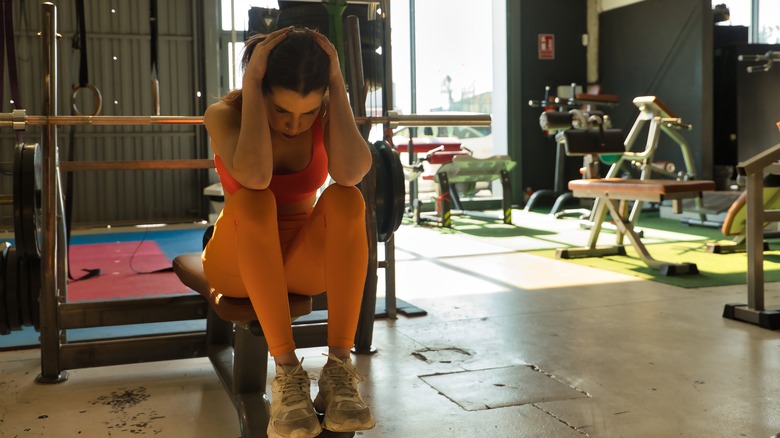Exercise is often prescribed as one of the solutions to a host of challenging problems. Feeling lethargic? Exercise. Getting over a breakup? Exercise. Dealing with mental health concerns? Exercise. And for good reason.
Clinical psychologist Dr. Nancy B. Irwin told Well+Good that our minds and bodies are connected. What we do in one, we feel in the other. “Maintaining even minimal physical fitness, such as power walking three times a week for 30 minutes, has a positive effect on the brain,” she explained. This is probably why experts recommend working out as one of the things you can do to reduce anxiety. Engaging in exercise can help someone with anxiety focus on their body instead of their mind and it boosts serotonin levels and helps build mental resilience in the long run, reports Harvard Health Publishing.
But, for some, going to the gym isn’t all it’s cracked up to be. They could feel like their anxiety starts acting up or even gets worse as they exercise. And there are a few different reasons why this could be happening, per the mental health professionals.
Why exercise might make anxiety worse

It might be useful to first understand how someone feels and what happens to their body during an anxiety attack. Your heart rate quickens, you sweat, and you experience shortness of breath. Exercising often brings on similar sensations. Someone with anxiety could associate those physical symptoms with an anxiety attack and start to feel anxious.
Stories of injuries or even past experiences of injury brought on by or during exercise can also contribute to someone feeling anxious during a workout, according to Psychology Today.
Also, gyms or fitness centers that involve group activity could be anxiety-inducing for someone who already feels socially anxious. Add to that the worry of not knowing how to use the equipment if you’re a first-timer and having to interact with trainers or other fitness enthusiasts, and there’s an environment that’s not the most conducive for someone who has a fear of being watched and judged by others. “Social anxiety is more than shyness. It’s a fear that doesn’t go away and affects daily activities, self-confidence, relationships, and work or school life. And, of course, exercising in gyms,” shared a licensed psychologist based in Istanbul, Turkey, Onur Bal, with Healthline.
Author of “The Anxiety Toolkit: Strategies for Fine-Tuning Your Mind and Moving Past Your Stuck Points,” Alice Boyes shared in Psychology Today that sometimes, anxiousness brought on by exercise could simply be about obsessive thoughts that tend to spiral. You could worry about germs from sharing equipment and machines at the gym or ruminate over something negative someone told you about your workout routine and things can get out of control. The important thing, according to Boyes, is to become aware of it and know the difference between your “anxiety-brain” and what’s actually happening.
Things you can do to get past exercise-related anxiety
Becoming aware of how your body is reacting to exercise can go a long way. “Whether before, during, or after the gym, being aware of what’s going on in your body can provide mental relief,” said Bal (via Healthline). The type of exercise you do could play a role too, added associate psychiatrist at Harvard Medical School Dr. Ashwini Nadkarni (via Shape). Aerobic exercises like Zumba and circuit training, which work your heart a lot more, can make your anxiety worse, according to Dr. Nadkarni. Barre workouts, yoga, pilates, and low-impact cardio exercises can be good workouts to try instead.
“Practice makes perfect,” is a mantra that’s associated with the most challenging encounters in life, and you can take a page out of that book here too. Start slow and work yourself up to longer or more challenging workouts. “The more you confront situations and symptoms that you perceive as threatening, the more you learn a new, non-threatening association in your brain,” explained clinical psychologist, Dr. L. Kevin Chapman to Bustle.
You can try working out at home or visiting the gym at non-peak hours if you’re worried about being surrounded by people. To make yourself more comfortable around equipment, go to the gym a few minutes earlier and ask the trainer to explain how each one works. Removing the element of uncertainty can work wonders for someone with anxiety, per Healthline.
There is no one way to reap the benefits of exercise if you are experiencing anxiety. Work with your therapist, if you must, and find a program that works for you.
